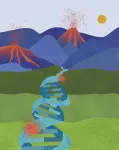(Press-News.org) Emperor penguin colonies experienced unprecedented breeding failure in a region of Antarctica where there was total sea ice loss in 2022. The discovery supports predictions that over 90% of emperor penguin colonies will be quasi-extinct by the end of the century, based on current global warming trends.
In a new study published today in Communications Earth & Environment, researchers from British Antarctic Survey discussed the high probability that no chicks had survived from four of the five known emperor penguin colonies in the central and eastern Bellingshausen Sea. The scientists examined satellite images that showed the loss of sea ice at breeding sites, well before chicks would have developed waterproof feathers.
Emperor penguins are dependent on stable sea ice that is firmly attached to the shore (‘land-fast’ ice) for the majority of the year, from April through to January. Once they arrive at their chosen breeding site, penguins lay eggs in Antarctic winter from May to June. Eggs hatch after 65 days, but chicks do not fledge until summer, between December and January.
At the beginning of December 2022, the Antarctic sea ice extent had matched the previous all-time low set in 2021. The most extreme loss was seen in the central and eastern Bellingshausen Sea region, west of the Antarctic Peninsula where there was a 100% loss of sea ice in November 2022.
Lead author of the study, Dr Peter Fretwell, said:
“We have never seen emperor penguins fail to breed, at this scale, in a single season. The loss of sea ice in this region during the Antarctic summer made it very unlikely that displaced chicks would survive.
We know that emperor penguins are highly vulnerable in a warming climate - and current scientific evidence suggests that extreme sea ice loss events like this will become more frequent and widespread.
Since 2016, Antarctica has seen the four years with the lowest sea ice extents in the 45-year satellite record, with the two lowest years in 2021/22 and 2022/23. Between 2018 and 2022, 30% of the 62 known emperor penguin colonies in Antarctica were affected by partial or total sea ice loss. Although it is difficult to immediately link specific extreme seasons to climate change, a longer-term decline in sea ice extent is expected from the current generation of climate models.
Understanding emperor penguin colonies
Emperor penguins have previously responded to incidents of sea ice loss by moving to more stable sites the following year. However, scientists say that this strategy won’t work if sea ice habitat across an entire region is affected.
Emperor penguin populations have never been subject to large scale hunting, habitat loss, overfishing or other local anthropogenic interactions in the modern era. Unusually for a vertebrate species, climate change is considered the only major factor influencing their long-term population change. Recent efforts to predict emperor penguin population trends from forecasts of sea ice loss have painted a bleak picture, showing that if present rates of warming persist, over 90% of colonies will be quasi-extinct by the end of this century.
The five colonies of penguins studied were all discovered in the last 14 years using satellite imagery - Rothschild Island, Verdi Inlet, Smyley Island, Bryan Peninsula and Pfrogner Point. All five colonies had been shown to return to the same location each year to breed, with only one previous instance of breeding failure at Bryan Peninsula in 2010.
Scientists now routinely use satellite imagery to discover and monitor emperor penguin colonies, as the brown stains of the birds’ guano stands out clearly against the stark white of ice and snow. The team used images from the European Commission’s Copernicus Sentinel-2 satellite mission, which has continuously monitored the area in Antarctica since 2018.
The impact of Antarctic sea ice loss
Over the past seven years, sea ice around Antarctica has decreased significantly. By the end of December 2022, sea ice extent was the lowest experienced in the 45-year satellite record. In the Bellingshausen Sea, the home of the penguin colonies in this study, sea ice didn’t start to re-form until late April 2023.
Since then, the deviation from the norm has intensified: as of 20 August 2023 the sea ice extent was 2.2 million km2 lower than the 1981-2022 median (17.9 million km2) significantly surpassing the record winter low on 20 August 2022 of 17.1 million km2. This missing area is larger than the size of Greenland, or around ten times the size of the United Kingdom.
Dr Caroline Holmes, a polar climate scientist at BAS, said:
“Right now, in August 2023, the sea ice extent in Antarctica is still far below all previous records for this time of year. In this period where oceans are freezing up, we’re seeing areas that are still, remarkably, largely ice-free.
Year-to-year changes in sea ice extent are linked to natural atmospheric patterns such as El Niño-Southern Oscillation, the strength of the southern hemisphere jet stream, and regional low-pressure systems.
We’ll need years of targeted observations and modelling to know precisely how much the current conditions are being influenced by these phenomena and by natural ocean variability. However, the recent years of tumbling sea ice records and warming of the subsurface Southern Ocean point strongly to human-induced global warming exacerbating these extremes.”
Climate models show a decline in Antarctic sea ice both under present and forecast human carbon dioxide emissions.
Dr Jeremy Wilkinson, a sea ice physicist at BAS, commented:
“This paper dramatically reveals the connection between sea ice loss and ecosystem annihilation. Climate change is melting sea ice at an alarming rate. It is likely to be absent from the Arctic in the 2030s - and in the Antarctic, the four lowest sea ice extents recorded have been since 2016.
It is another warning sign for humanity that we cannot continue down this path, politicians must act to minimise the impact of climate change. There is no time left.”
“Record low 2022 Antarctic sea ice led to catastrophic breeding failure of emperor penguins” by Peter T. Fretwell, Aude Boutet, Norman Ratcliffe, is published in Communications Earth & Environment, https://doi.org/10.1038/s43247-023-00927-x
END
Loss of Antarctic sea ice causes catastrophic breeding failure for emperor penguins
2023-08-24
ELSE PRESS RELEASES FROM THIS DATE:
Clinical outcomes and overestimation of oxygen saturation in patients hospitalized with COVID-19
2023-08-24
About The Study: Overestimation of oxygen saturation by pulse oximetry led to delayed delivery of COVID-19 therapy and higher probability of readmission regardless of race in this study of 24,000 patients. Black patients were more likely to have unrecognized need for therapy with potential implications for population-level health disparities.
Authors: Tianshi David Wu, M.D., M.H.S., of the Baylor College of Medicine in Houston, is the corresponding author.
To access the embargoed ...
Excess all-cause mortality in China after ending the zero COVID policy
2023-08-24
About The Study: In this study across all regions in mainland China, an estimated 1.87 million excess deaths occurred among individuals 30 years and older during the first two months after the end of China’s zero COVID policy, a proactive strategy that deploys mass testing and strict quarantine measures to stamp out any outbreak before it can spread.
Authors: Hong Xiao, Ph.D., and Joseph M. Unger, Ph.D., M.S., of the Fred Hutchinson Cancer Research Center in Seattle, are the corresponding authors.
To access the embargoed study: Visit our For The Media website at this link https://media.jamanetwork.com/
(doi:10.1001/jamanetworkopen.2023.30877)
Editor’s ...
Assessment of AI chatbot responses to top searched queries about cancer
2023-08-24
About The Study: The findings of this study suggest that artificial intelligence (AI) chatbots generally produce accurate information for the top cancer-related search queries, but the responses are not readily actionable and are written at a college reading level. These limitations suggest that AI chatbots should be used supplementarily and not as a primary source for medical information.
Authors: Abdo E. Kabarriti, M.D., of the State University of New York Downstate Health Sciences University ...
Combining immunotherapy with KRAS inhibitor eliminates advanced KRAS-mutant pancreatic cancer in preclinical models
2023-08-24
HOUSTON ― Researchers at The University of Texas MD Anderson Cancer Center have uncovered a functional role for KRAS mutations in pancreatic cancer and rapidly translated these findings into a novel therapeutic approach combining a KRAS G12D inhibitor with immune checkpoint inhibitors for early- and late-stage KRAS G12D-mutant pancreatic cancer. The combination therapy led to durable tumor elimination and significantly improved survival outcomes in preclinical models, leading to the launch of a Phase I clinical trial.
Two studies, published today in Developmental Cell and Cancer Cell, describe why KRAS-targeted monotherapy likely is not enough ...
Breakthrough in β-lactam synthesis using nickel catalysts
2023-08-24
Led by Director CHANG Sukbok, scientists from the Center for Catalytic Hydrocarbon Functionalizations within the Institute for Basic Science (IBS) have made a significant advancement in the synthesis of β-lactam scaffolds, which are structural components frequently found in essential antibiotics such as penicillins and carbapenems. This breakthrough overcomes challenges in β-lactam synthesis to promise streamlined pathways for drug development.
The core chemical structure that makes up penicillins is a four-membered cyclic amide scaffold called chiral ...
Lignocellulose bio-refinery developed for value-added chemical overproduction in yeast
2023-08-24
Lignocellulosic biomass is a renewable feedstock for 2nd-generation biomanufacturing. In particular, efficient co-fermentation of mixed glucose and xylose in lignocellulosic hydrolysates is a key issue in reducing product costs.
However, co-utilization of xylose and glucose in microbes is challenging due to limited xylose assimilation and the glucose repression effect.
Recently, a research group led by Prof. ZHOU Yongjin from the Dalian Institute of Chemical Physics (DICP) of the Chinese Academy ...
ChatGPT shows limited ability to recommend guidelines-based cancer treatments
2023-08-24
Correct and incorrect recommendations inter-mingled in one-third of the chatbot’s responses, making errors more difficult to detect
For many patients, the internet serves as a powerful tool for self-education on medical topics. With ChatGPT now at patients’ fingertips, researchers from Brigham and Women’s Hospital, a founding member of the Mass General Brigham healthcare system, assessed how consistently the artificial intelligence chatbot provides recommendations for cancer treatment that align with National Comprehensive Cancer Network ...
Topography of the genome influences where cancer mutations thrive, study shows
2023-08-24
Researchers at the University of California San Diego have uncovered a connection between the topography of the human genome and the presence of mutations in human cancer. They found that certain regions of the genome, which exhibit unique features, act as hotspots for the accumulation of mutations.
The findings, published recently in Cell Reports, shed light on how the 3D architecture of the human genome may play a role in the development of various forms of cancer.
The human genome is often visualized as the iconic DNA double helix, composed of long sequences of the letters A, C, G and T. “However, the genome ...
Pioneering treatment highly effective for rare kidney disease
2023-08-24
A pioneering drug for a rare kidney disease prevents organ failure and significantly improves the outcome for patients, new research has confirmed.
Atypical Haemolytic Uraemic Syndrome (aHUS) is a genetic life-threatening condition caused by a defect in the immune system which leads to kidney failure.
Newcastle University, UK, carried out clinical trials into the drug, eculizumab, which eventually led to the NHS approving the treatment for use in patients from 2015.
Now, a study by Newcastle experts, published in Blood, ...
Getting protein factories to run – How deubiquitinating enzymes moonlight as Fubi proteases
2023-08-24
Fubi is produced by cells as a fusion protein with the ribosomal protein S30, and must be separated from S30 by proteases for functioning ribosomes. In immune cells, this by-product of ribosome production is utilized as a secreted signalling molecule, for example to locally reduce the activity of the maternal immune system in the uterus and to thus enable embryos to implant. How Fubi is specifically recognized by proteases and how they distinguish it from ubiquitin was previously unknown.
First author Rachel O’Dea and Malte Gersch explain their research in detail:
What is the discovery that you made and why is it exciting?
Our team revealed ...





